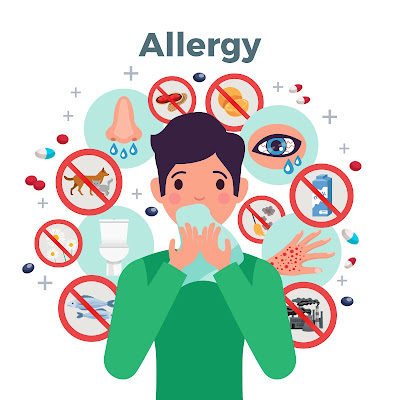Allergies Reaction and Cause
Allergies are caused by different factors that can trigger certain immune system responses. These reactions may be triggered by environmental conditions, foods, air-borne particles, chemicals, and other substances. Different types of allergies have been identified based on the causes of these reactions. In this article, we’ll go over the different types of body allergy symptoms that you might experience.
Food Allergies Reactions
Food allergies usually develop very early in life and can cause immediate, mild allergic reactions to specific food ingredients. Over time, they can become severe enough to affect your health, leading to a variety of symptoms including asthma attacks, hives, eczema, and even anaphylactic shock. While some people have no reaction to a particular food, others can react severely if their bodies cannot recognize the food and its components.
Contact Dermatitis
Contact dermatitis is typically caused by exposure to irritants like soap and detergents. This type of skin allergy can occur anywhere on the body, but often appears on areas near the eyes, hands, feet, and scalp. Symptoms include itching, redness, edema (swelling), vesicles (small fluid filled blisters), and crusting.
Atopic Dermatitis
The prevalence of allergy-related diseases has increased rapidly over the last few decades and continues to increase at alarming rates. There are many reasons that explain this trend including aging of the population, better diagnostics, and environmental factors. Atopic dermatitis (AD) is a chronic inflammatory skin disease that affects 10–30% of individuals worldwide. AD is characterized by severe itching and redness of the skin accompanied by eczema. In addition to discomfort, people affected by AD have a higher risk of developing asthma, allergic rhinitis, and other allergies. In children, sleep problems and school absenteeism also occur. A significant portion of patients suffer from depression and anxiety due to the physical symptoms associated with their condition. Some studies suggest that AD can interfere with normal cognitive development in children; however, further research is needed to fully understand the long term effects of AD on both adults and children.
Allergies caused by Alcohol
If you have ever tried to make your own alcoholic beverage, then you know that it can be extremely difficult finding a suitable recipe. If you are like me, then you use many different ingredients to try and find something that works. The problem is that some ingredients are not good for you and may even be dangerous if consumed at high levels. This makes making your own alcohol a risky endeavor.
Although this article isn't about using alcohol for recreational purposes, I do want to talk about what allergies are associated with drinking, what effects alcohol has on the body, and how it affects people's health. Alcohol is a chemical that has been used by humans for thousands of years. Today, we still consume alcohol, but not as much as we did in the past. Nowadays, most people drink beer, wine, liquor, and other forms of alcohol. You may have already heard stories from friends or family members who have experienced adverse side effects after consuming alcohol. They may say things like their stomach hurts, they feel nauseous, or they experience headaches later in the day. These symptoms can happen for various reasons. Some people may have food intolerances, while others may simply have a bad reaction to certain chemicals.
How can know if allergic ?
A lot of people are wondering how they can know if they're allergic to something. This can be very frustrating and sometimes scary especially if you have allergies that could potentially affect your life. People who are interested in their health often try to learn about things like this to avoid any potential health problems. If you want to know more about things you should look into, then continue reading!
There are several ways to figure out what you're allergic to. One way would be to call a doctor who specializes in allergy testing. They may give you a skin test or ask you questions about whether or not you've been exposed to certain substances. You can also get tested online with companies like www.allergyezone.com. These tests are less expensive than having them done in person and are usually accurate as well.
Another method is to use a self-test kit from the pharmacy. There are kits that contain small samples of different allergens including pollen, dust mites, food, etc. You place these on your face and wait a little bit. Then, you rinse off the area and read the results. A few days later, you can compare those results to the ones that came back from the doctor. From there, you could find out what type of allergies you have and learn how to best treat them.



No comments:
Post a Comment
Thanks